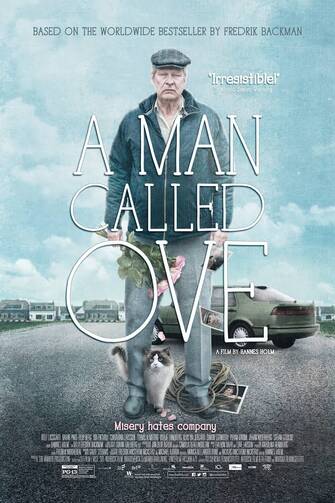The literary critic for The Spectator, Mark Mason, referred to Fredrik Backman’s 2012 novel A Man Called Ove as “a novel for men who don’t read novels.” That turned out to be a lot of men (and women). The book took off from its native Sweden, swept in readers from all over Europe, and emerged as an American paperback in 2015. Now a film adaption, written and directed by Hannes Holm, is opening in the United States already loaded down with Swedish awards.
It has caught on, perhaps, because it is about someone we all know—the aging curmudgeon down the street, a lonely widower who has been sent out to pasture after 43 years on the job by young execs convinced he does not gel with their plans for a high-tech revamping of their railroad business. A few years before, he was voted out as head of the neighborhood association, but he persists in imagining he is in charge. So the camera follows him as he strides through the street, head high and shoulders back, a bit overweight, his eyes scouring his environment, harrumphing and barking at cars not allowed on this alley, at whoever failed to lock the gate and whoever left that cigarette butt on the sidewalk.
But there is more to him than what we first see. Again and again, we join him in his visits to the graveyard. He talks to his wife (“I’m sorry I’m late”), brings her up to date, caresses the top of the gravestone and goes home alone. There he stands on a footstool, attaches a rope to a hook in the ceiling and forms it into a noose around his neck; but again and again, just as he is about jump the phone or doorbell rings or there’s a ruckus outside. A neighbor wants to borrow a ladder. As tension rises, more determined, he darkens a room, strips to his underwear and places the barrel of his shotgun in his mouth.
One event has complicated his daily life—or, rather, enriched it. A young man and his Persian wife have moved in next door. They presume his generosity, get help from his practical and mechanical skills and adopt him him into their family life as her pregnancy progresses. And at critical moments, sometimes when his continued suicide attempts are interrupted, flashbacks take us through his earlier life.
While the actor who plays older Ove, Rolf Lassgard, is bulky, Filip Berg who plays him as a young man is tall, thin and handsome, with little physical resemblance to the other Ove we are beginning to know. In the blink of an eye, we witness his father being killed by a train. We delight in his love for a beautiful young school teacher (Ida Engvoll) with a radiant smile and witness the bus crash that changes their lives.
I Googled the Swedish word “ove” with the passing thought that the author was roping us in with a variation of “love.” The film, ultimately, is about love in its many forms. In a mini sub-plot, a young friend of Ove brings another young man to Ove’s house because the other fellow happens to be gay and has somehow been driven out of his apartment and has no place to stay. Ove gives him shelter. Mean old Ove melts when the children of his neighbors enjoy seeing him; he is being reborn with the attention and support of others. He even shows affection for his cat. The word “Ove,” though, is just a name.
On the other hand, the book and film have been presented as comedies, and we are invited to laugh at the idea that he continually tries to kill himself, not so much because he is suffering depression but because he believes in the afterlife and expects that this will reunite him with Sonja, his wife. Finally, Ove is referred to as the “old man,” but he is only 59 (the same age as the actor who portrays him). Today, that’s not old enough to be a grump.
Raymond A. Schroth, S.J., is literary editor of America.








